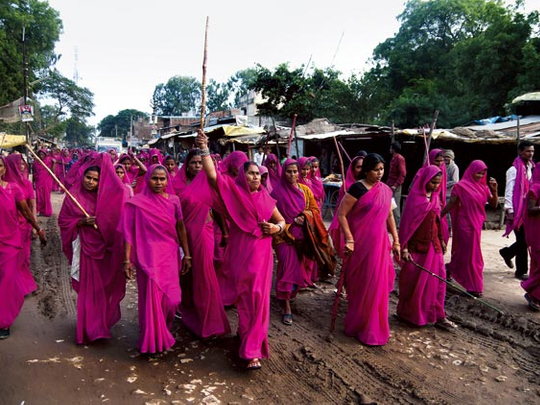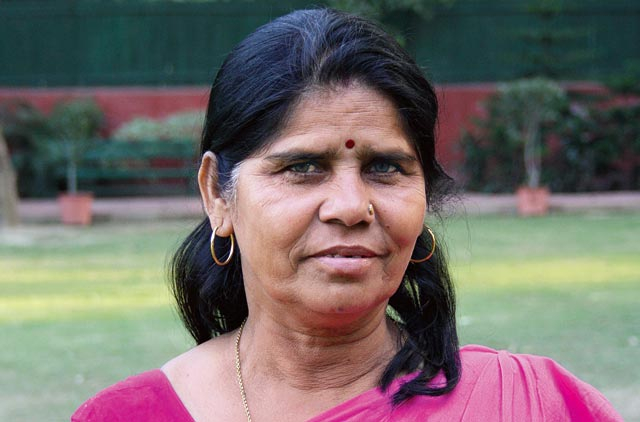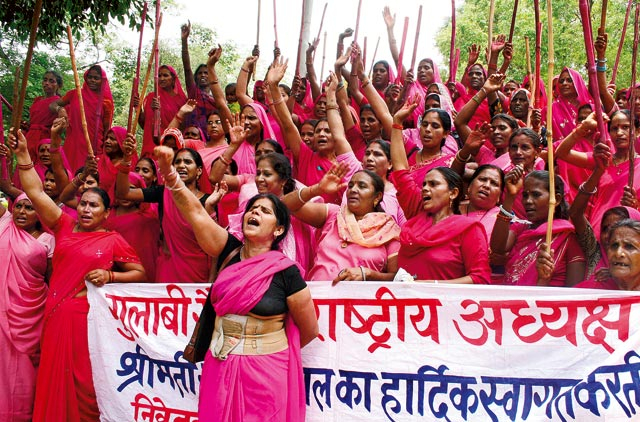
It was an incident that barely raised eyebrows or turned heads in a village in the Banda district of Uttar Pradesh, a rural hinterland in India. A man was mercilessly beating his wife in public. In a region where male chauvinism is rife, the woman was meekly accepting the assault. Worse still, no one came forward to help. Heads bowed, dozens hurried past desperate not to get involved. But disgusted by the attack and people’s indifference to it, a local woman, Sampat Pal Devi, decided to do something. “I’d seen this happen before and hadn’t reacted, but this time for some reason I became infuriated to see the man assaulting his wife,’’ she says.
Sampat, who was 43 at the time, walked up to the man and quietly but firmly told him to stop abusing his wife. “Don’t you dare interfere,’’ he yelled, hurling a few expletives her way before continuing to thrash his wife.
Sampat then turned to the woman and urged her to defend herself. But the wife was too scared to protest in case of further reprisals.
For Sampat, who had been married at 12 and had five children by the age of 20, it was a tipping point. “I’d witnessed many injustices, such as girls being prevented from getting an education or a poor person’s land being grabbed by the rich, which I couldn’t do anything about,’’ she says. “But this time I could do something. I could help this woman somehow.”
So she decided to take the law into her own hands. She gathered a few women from the neighbourhood and armed them with long bamboo sticks, called lathis. Sampat and the women returned to the man’s house later that evening. “Why did you beat your wife?’’ she demanded, dragging him out of his house.
There, as he cowered, she and the other women thrashed him with their sticks only stopping when he promised never to hit his wife again. He only received a few minor bruises but his pride was badly injured. The man learnt a lesson and so did Sampat.
‘The power of unity’
“When I’d confronted him alone, he refused to listen to me,” she says. “But when I approached him with a group of women, he admitted his mistake. It was then that I realised the power of unity. Only if you stay together can you fight such crimes in society.” News of the incident spread to the surrounding villages, and rather than being angry at her, everyone supported Sampat and the women for being so brave and taking a stand against domestic violence.
Determined to bring about positive change in her traditional society, Sampat decided to form a permanent band of women vigilantes to confront issues and wrongdoers in the community. She decided that the group would dress in pink – gulabi in Hindi. “It’s a strong feminine colour and I like it,” she says. And so the Gulabi Gang was created. “We are not a gang in the usual sense of the term,’’ Sampat insists. “We are a gang for justice.’’
It started with just five members in 2006, but today her gang boasts more than 20,000 women in chapters in villages across India. Over the years, the group has staged marches to police stations and confronted officers who refused to register complaints of abuse against women. They have threatened and even attacked men who beat their wives; prevented child marriages; educated parents on the ills of the dowry system and encouraged girls to go to school. In 2011, The Guardian newspaper in the UK listed Sampat as one of the top 100 women activists and campaigners in the world.
Fighting for her rights is nothing new for Sampat, now 50, who has been fighting injustice in her traditional society since she was a child.
The eldest of four children, she says her circumstances forced her to become a rebel.
She explains how gender discrimination existed even in her own home growing up in Bidausa village, in Bundelkhand, Uttar Pradesh. “Like others in our community, my parents – Gudiya, a housewife, and Ram Asrey Pal, a shepherd – felt that girls did not require an education. So while my two brothers were sent to school, my sister and I were made to herd cattle in the fields all day.’’
But Sampat was keen to learn to read and write so she used to slink away from the fields and hover near the windows of the local boys’ school listening to the teachers giving lessons. “I was around ten at the time and learnt to read and write by absorbing what I could from outside the boys’ classroom. Of course, my parents didn’t know about this. They surely would have stopped me if they knew I was learning to read and write because they believed education was not good for girls.’’
Her life took a turn for the better when one day her paternal uncle spotted her eavesdropping outside the boys’ classroom.
“I expected to be in big trouble, but he was very kind and progressive. After realising that I was keen to improve myself, he asked if I would like to attend a school. Of course, I gladly said yes and he ensured that I got admission in a local government school for girls, a short distance away from the village.’’
Sampat relished the chance to receive an education and never missed a lesson or the chance to show off her academic skills to her reluctant family. “After returning from school, I’d write the Hindi and English alphabet on the walls of my house – we didn’t have many notebooks – and study them every morning and night. I also used to draw flowers and animals in the mud. I was so happy to study,” she says. Along the way, she also learnt to sew after watching some women in her neighbourhood, and became proficient in embroidery and dress making.
All this was beginning to worry Sampat’s parents. They had only reluctantly given in to their daughter’s desire to get an education, and fearing that she might go ‘wayward and immoral’ if she were allowed to study, they conspired and married her off when she was barely 12 years old. Although she was upset, there was little she could do, and had to give up her formal education.
Moving out of her parents’ home to live with her husband Munni Lal Pal, an ice cream vendor nine years her senior, and her in-laws in the neighbouring district of Banda was not easy. “There were some set rules that a traditional daughter-in-law had to follow. I could have meals only after everyone in the family had eaten. I found that hugely discriminatory and unreasonable so I would eat when I felt hungry.” This along with some of Sampat’s other actions, like going out alone or speaking loudly, were perceived as rebellious and unwomanly by her traditional in-laws. The rift between them began to widen.
When the conflict between them became too much to handle, Sampat, Munni and their children moved out of the family house and set up a home of their own. To supplement her husband’s meagre income, Sampat took a job as a government health worker. Fortunately, her husband encouraged her to realise her dreams.
Fighting the system
It was while working in the public sector that Sampat says she often witnessed instances of injustice towards the poor. She found that government funds allocated for the poor were being misappropriated by those in power. “I voiced my views and on several occasions fought on behalf of the poor. But I realised that it was difficult to fight against the system while working for the government, so I quit,” she says.
Sampat was determined to live by her principles. To make ends meet she took a sewing job. Slowly, she saved money and in a few years she managed to buy a couple of sewing machines. She opened a training centre for the local girls hoping to teach them a skill and give them the power to be self-reliant.
“I simply loathed the traditional view that girls should not be educated and that they should be married off early,” she says. “I want girls to get a good education, and learn a skill so they can be independent and will not have to rely on their fathers or husbands for everything. I also want to instil in them the power to stand up for their rights, fight against child marriages, the dowry system and be counted as a person.’’
She began holding meetings with women in her village. “Of course, it was not easy,’’ she admits. “Most of the women had never heard of anything like rights as they were born and brought up to remain subjugated by the men.’’ Over time she managed to convince a small group of women to take up cudgels to fight against child marriages, dowry deaths and misappropriation of government funds.
After the incident in 2006 when she and her group first thrashed the man who beat his wife in public, the villagers began to look at women with new respect. Almost overnight Sampat became known as a saviour of women. Women from her village, and surrounding ones, began approaching her to help them.
“I remember one woman coming to us and begging us to help release her husband who was being detained unlawfully in a local police station,” she says. “Our team surrounded the police station and demanded that the man be released. A verbal duel ensued between the policemen and us and when a cop used abusive language, I lost my temper and slapped him.” Her gang then thrashed the cop for verbally abusing their leader.
Charges were levelled against Sampat and the other women, but when all the villagers supported her actions and threatened to protest if Sampat was arrested, the police agreed to withdraw the charges. The police also agreed to release the man they had detained.
“We promised to help women in distress and fight for their rights,’’ says Sampat. With the little savings she had, she provided her team with pink sarees. The women are trained to use a lathi to protect themselves and use it in case of threat to them or their families.
Public shaming
The gang initially targeted any male who was subjugating his wife, daughter or sister. “Our members would confront the male offender and try to make him see reason. If he didn’t change his behaviour we’d publicly shame him,” she says. “We only use lathis if the men attack us either verbally or physically.’’
Sampat and her gang members have never been arrested although they have faced charges of rioting and forming unlawful groups. “Early on, a few people filed cases against me, but quickly retracted them when they realised that they were in the wrong,’’ she says.
The pink sisterhood is forcing change in the system with direct action and confrontation. They have prevented and stopped atrocities against women and children, prevented corruption in the public distribution of food to poor people and in the distribution of pensions to elderly widows who have no proper records.
Men applaud Sampat and some are even associated with her group. Jaiprakash Shivhari, a local man who has been working as coordinator with the Gulabi Gang since its inception says, “Banda is in one of the poorest parts of India’s most populous state, Uttar Pradesh. So it’s important to ensure that funds reach the right people. Often the poor have no support, but collectively the women are not afraid of breaking the rules and defending the weak. That’s why they have earned respect.”
The Gulabi Gang’s actions have not gone unnoticed. The women received a special mention at the Kelvinator 11th GR8! Women Awards in 2012 for restoring dignity to women. The awards are an initiative of The Indian Television Academy that honours women achievers from all walks of life.
Sampat has travelled to the US, France, Sweden and Italy where she has spoken about discrimination and standing up for women’s rights.
“It surprises me that even in Western countries women admire me. Many of them say they are inspired by me and have begun fighting for their rights at home and in the workplace after reading about me,” she says.
Sampat and her gang are the subject of the 2010 movie, Pink Saris, by Kim Longinotto and there’s also a documentary on her called Gulabi Gang, by Nishtha Jain.
‘I fear no one’
Fearless and fastidious, Sampat has changed the way women live in villages, particularly in northern India. Intolerant of any kind of injustice, she says, “I fear no one. We challenge stereotypes and intervene where the law refuses to help us and age-old traditions exploit women.
“We fight for the oppressed and confront those who misbehave with women. We have dealt firmly with people who would kill their newborn on finding she is a girl. It is also easy for me to understand problems that young girls face because I have gone through the grind. Women come out of their homes to fight for their rights only when they find that no one at home speaks for them. “In villages, no one comes to the rescue of women. That is why we are sometimes forced to take the law into our hands.”













